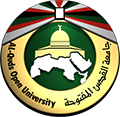Overview
The need to orient students from different educational backgrounds to resolve psychological, social, and academic problems at school or university levels has brought the idea of developing a Master’s Degree in Psychological and Educational Counseling. The program aims at helping students overcome any social, behavioral or psychological issues that hinder their academic studies, or cope with any other social or health issues to help them achieve their full academic potential.
Students are accepted into the program according to specific criteria and requirements. After enrollment, students are expected to pass 36 credit hours and choose either to write a thesis or have a comprehensive exam as an integral part of their study plan in order to receive their certificate.
- Graduating qualified professionals capable of working in higher education and social institutions that provide psychological and educational counseling. Furthermore, graduates should be able to offer technical consultation to both public and private sector institutions and centers specialized in rehabilitation, counseling and welfare.
- Offering a professional training program to equip graduates with the necessary skills for intervention, as well as to provide psychological and educational counseling for all sectors of the community including students, children and families.
- Contributing in the development of the field of psychological and educational counseling at universities and schools.
- Following up with all the developmental matters related to the field.
- Equipping students with different sets of skills to plan, manage and develop counseling service programs.
- Training students on how to manage individual cases and how to conduct counseling sessions, discussions, and psychological and educational tests. Students should also be capable able to develop and execute effective counseling programs.
- Providing students with both theory and practice related to psychological and educational counseling.
- Providing students with technical knowledge and skills within the context of the different cultural, social, economic, and educational layers of the society.
- Providing students with an overall comprehension on the psychological, social, health and economic problems, and helping them find the appropriate strategies to resolve or cope with these issues.
- Developing students’ skills in conducting qualitative and quantitative surveys to address, analyze and detect the psychological problems in the society.
- Training students on collecting diagnostic data, as well as wiring reports and coding them for confidentiality purposes.
- Promoting teamwork among students and enhancing their work ethics.
Graduates will be able to work in higher education and social institutions that provide psychological and educational counseling.
Furthermore, graduates can offer consultation and work at both public and private sector institutions which are specialized in rehabilitation, counseling, and welfare


